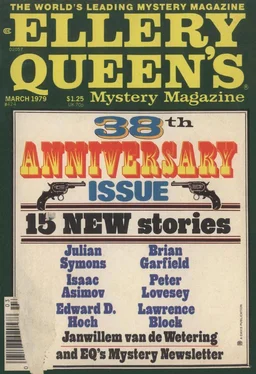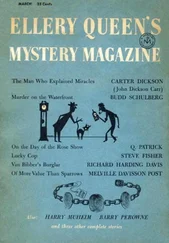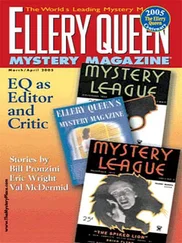Isaac Asimov - Ellery Queen’s Mystery Magazine, Vol. 73, No. 3. Whole No. 424, March 1979
Здесь есть возможность читать онлайн «Isaac Asimov - Ellery Queen’s Mystery Magazine, Vol. 73, No. 3. Whole No. 424, March 1979» весь текст электронной книги совершенно бесплатно (целиком полную версию без сокращений). В некоторых случаях можно слушать аудио, скачать через торрент в формате fb2 и присутствует краткое содержание. Город: New York, Год выпуска: 1979, ISBN: 1979, Издательство: Davis Publications, Жанр: Детектив, на английском языке. Описание произведения, (предисловие) а так же отзывы посетителей доступны на портале библиотеки ЛибКат.
- Название:Ellery Queen’s Mystery Magazine, Vol. 73, No. 3. Whole No. 424, March 1979
- Автор:
- Издательство:Davis Publications
- Жанр:
- Год:1979
- Город:New York
- ISBN:ISSN: 0013-6328
- Рейтинг книги:3 / 5. Голосов: 1
-
Избранное:Добавить в избранное
- Отзывы:
-
Ваша оценка:
- 60
- 1
- 2
- 3
- 4
- 5
Ellery Queen’s Mystery Magazine, Vol. 73, No. 3. Whole No. 424, March 1979: краткое содержание, описание и аннотация
Предлагаем к чтению аннотацию, описание, краткое содержание или предисловие (зависит от того, что написал сам автор книги «Ellery Queen’s Mystery Magazine, Vol. 73, No. 3. Whole No. 424, March 1979»). Если вы не нашли необходимую информацию о книге — напишите в комментариях, мы постараемся отыскать её.
Ellery Queen’s Mystery Magazine, Vol. 73, No. 3. Whole No. 424, March 1979 — читать онлайн бесплатно полную книгу (весь текст) целиком
Ниже представлен текст книги, разбитый по страницам. Система сохранения места последней прочитанной страницы, позволяет с удобством читать онлайн бесплатно книгу «Ellery Queen’s Mystery Magazine, Vol. 73, No. 3. Whole No. 424, March 1979», без необходимости каждый раз заново искать на чём Вы остановились. Поставьте закладку, и сможете в любой момент перейти на страницу, на которой закончили чтение.
Интервал:
Закладка:
Christine-Zela left the stage and then the hypnotist called for volunteers from the audience.
One man was told that he was swimming the English Channel and the audience roared at his exaggerated strokes in the air. Another man was told he was George Washington.
“You are now going to chop down the cherry tree,” the hypnotist said. “Here is your hatchet,” and he placed an invisible object in the man’s hand.
The man tightened his fist and began to swing at the air, chopping furiously. The audience laughed, a swell of sound that hurt Ruth’s ears.
The man’s face was getting red and he was breathing hard.
The soft little hand clutched Ruth’s arm. “Isn’t that funny? Isn’t it?”
Ruth watched the man’s arm go up and down, up and down. The laughter grew and the lights were burning Ruth’s eyes. She squinted to see and now something was flashing in the man’s hand. Up and down, up and down.
She began to climb the stairs. The hot light shifted around her. Now she stood in the doorway of the bedroom. Outside, there was sun and bright sky. And in the room a dumpy old woman. No. The light shifted again. It was a man. Not in the bedroom. Somewhere else. She lifted her arm. Again and then again. The red mist fell around her and the room dissolved.
“Ruth,” someone said.
“That’s not my name.”
There was a laugh and she opened her eyes. Her father and his wife were leaning over her, their faces too close. The purple curtains were pulled across the stage and the people were leaving.
Ruth rubbed her eyes. “I must have fallen asleep.”
Her father’s wife chirruped. “Poor baby! We’ve kept her up too late. She doesn’t even know who she is!”
Her father grinned and patted Ruth’s hand. “She used to say that all the time when she was little. We’d say ‘Ruth, do this,’ or ‘Ruth, do that,’ and she’d say, ‘That’s not my name.’ ”
His wife put her little hand against Ruth’s cheek.
“I know who she is. She’s our little girl.”
Ruth, suffocating in the new red dress, shivered under the hand on her flesh.
On the ride home Ruth sat in the back seat. This was her place now, but she did not mind. Being there put her farther away from the chatter of her father’s wife. She was terribly afraid that some day they might ask her to sit between them.
She kept her face turned to the window. Stars glittered icily in the late-night sky and the houses and lawns were dusted with snow.
Once, when the chirping stopped for a moment, Ruth asked her father a question.
“Did I tell you what my name was when I said I wasn’t Ruth?”
“No.” There was a grin in her father’s voice. “I always thought it might be Cleopatra.”
Laughter trilled from his wife’s mouth.
Don’t, Ruth thought. But the sound went on, spiraling deep into her mind, touching forgotten pain.
Before she went to bed, Ruth was given a cup of hot chocolate. She sat in the living room, alone with her father. He poked at the ashes in the fireplace and yawned now and then. His wife had already gone into their bedroom. “To undo my face,” she said. Perhaps even now she was smearing her skin with the gooey pink cream she favored.
“I must have been a funny little thing,” Ruth said to her father.
“Um?” He covered another yawn with his hand.
Ruth sipped from the cup. The chocolate was too sweet. She thought of the soft hands that poured the milk and stirred the sugar and cocoa. She put the cup down, feeling a little sick.
“I said I must have been a funny thing when I was little. Do you remember when I thought I had a sister?”
Her father turned to her and smiled. “I sure do. You toddled around the house calling her.”
“Did she have a name?”
“I don’t think so. You just called for ‘sister’.”
Ruth picked up the cup and held it to her lips, but she didn’t drink. She could taste the name on her tongue. The name of her sister. But even as she searched for it, it drifted away.
She looked up at her father. “Do we look at the pictures now?”
Each year, on her birthday, she and her father looked at the family album and he told her about the woman in the pictures — the slim smiling woman who had been her mother and had died too soon.
Her father’s eyes slid to the doorway and then back to Ruth. “It’s late,” he said. “We’ll do it tomorrow.”
When he kissed her good night, Ruth thought, I’ll hurry to sleep. She could feel the dream just behind her eyes, waiting.
Deep in the night she woke, listening.
Sleet rustled against the windows.
Rain, she thought. We need it. It’s been so hot.
She got out of bed and went to the window. She did not see the frozen darkness. She saw instead a sun-soaked yard. A picket fence. Houses close by.
No. No rain. She sighed and lifted invisible hair from her hot neck.
She straightened her bed and left the room.
The house with its patchwork of rooms was very quiet. Sun pressed against the windows. The air was clotted with heat.
She went into the kitchen, wrinkling her nose at the smell. Mutton broth. How could they, on such a morning?
She went to the back door, holding aside a skirt that did not exist. She opened the door and looked out into the dark. She saw the barn. And the pear tree. The yard washed in sunlight.
The stovewood was stacked close by the steps. The hatchet lay on top of the pile, its blade catching the light. She smiled.
When her hand closed around the wooden handle, she knew at last what the thing in her hand was...
When it was over and all the people came — the police, the doctors, the neighbors — she was the only one who remained calm. But she was very puzzled. They kept putting their horror-struck faces close to hers and calling her “Ruth.”
Why were they doing this? To confuse her, perhaps. To make her confess.
But she gave them no satisfaction. She sat very stiffly in her chair, her hands folded in her lap. She knew how to be careful. Very, very careful.
At last one of the doctors came to her and took her bloodstained hand in his.
“Ruth...”
She turned to him and with her free hand smoothed the wrinkles from her invisible skirt.
“Why do you call me that? Surely you know my name.”
“No.” The doctor’s hand was cold and trembling. “I don’t know your name. Please tell me what it is.”
Poor fool! She straightened and took her hand from his.
“I’m Miss Borden, of course,” she said. “Miss Lizzie Borden.”
A Type of Murder
by Dorothy A. Collins [18] © 1979 by Dorothy A. Collins.
Dorothy A. Collins’ first story, “ Found on the Cookbook Shelf,” appeared in the October 1978 issue of EQMM. Since her first sale and her debut in print she has been working hard, and her second published story shows much more confidence with the form and a much more imaginative approach to plot. Carry on, Dorothy Collins, let nothing impede your progress...
Uncle Avery wrote Gothic mysteries. I thought they were dreadful things, but the public gobbled them up like hamburgers, and he made a fortune out of them. Unhappily, success soured him, because it wasn’t the kind of success he really wanted. But the money kept rolling in, so he kept churning out his tales of maidens-in-distress, and growing meaner and more embittered every year.
I was his housekeeper-and-secretary. He’d offered me the job when my husband died, and I grabbed it like a lifeline. He was my father’s brother, and outside of a few scattered cousins I was his only relative. Naturally I had great expectations, and I thought that besides latching onto a job I really needed, and a good one at that, I could reinforce my position by taking good care of him. And at first it wasn’t too bad.
Читать дальшеИнтервал:
Закладка:
Похожие книги на «Ellery Queen’s Mystery Magazine, Vol. 73, No. 3. Whole No. 424, March 1979»
Представляем Вашему вниманию похожие книги на «Ellery Queen’s Mystery Magazine, Vol. 73, No. 3. Whole No. 424, March 1979» списком для выбора. Мы отобрали схожую по названию и смыслу литературу в надежде предоставить читателям больше вариантов отыскать новые, интересные, ещё непрочитанные произведения.
Обсуждение, отзывы о книге «Ellery Queen’s Mystery Magazine, Vol. 73, No. 3. Whole No. 424, March 1979» и просто собственные мнения читателей. Оставьте ваши комментарии, напишите, что Вы думаете о произведении, его смысле или главных героях. Укажите что конкретно понравилось, а что нет, и почему Вы так считаете.












